California farmers feel more threatened by climate policy than they do by climate change, according to a new study from the University of California, Davis.
The study, published in the journal Global Environmental Change, found that the greatest climate risk Yolo County farmers believe they face in the future is not drought, water shortages, or temperature changes, but government regulations.
However, this view did not make them less likely to participate in government incentive programs that would help their climate adaptation and mitigation efforts.
“We found that the past matters,” said lead author Meredith Niles, a doctoral candidate in the Graduate Group in Ecology and Department of Environmental Science and Policy at UC Davis. “Farmers’ past perceptions of different environmental policies had a larger impact on their climate change beliefs and policy behaviors than their actual experience with climate change.”
Yolo County is a north Central Valley community that is home to UC Davis and a diverse mix of crops and livestock systems. More than 80 percent of land in Yolo County is devoted to agriculture.
UC Davis researchers analyzed 162 surveys returned by farmers and ranchers in 2011, and they conducted interviews with 11 farmers and two cooperative extension agents in 2010.
In Yolo County, 54 percent of farmers responding to the survey accepted that climate change was occurring. Of these, only 35 percent believed humans play a role in climate change.
Farmers were asked about their attitudes toward four specific environmental policies: pesticide use reporting (implemented in 1990), rice straw burning regulations (1991), a water quality conditional waiver program (2003), and stationary diesel engine emission regulations (2007). Farmers who had negative past experiences with environmental policies — viewing them as too costly or time-consuming, for example — showed less belief in climate change.
Farmers also tended to view policies that had been around the longest more positively, indicating that perceptions can become more favorable over time.
Several farmers viewed climate change as something in the far distant future, rather than as an immediate threat. They viewed the need to adapt to changing weather as a centuries-old, inherent part of farming.
The study quoted one farmer as saying: “For me, to be concerned about it [climate change] at my level and at my point, I don’t think it’s useful for me. I have other more important things that affect my business or my family that I want to spend time on versus something that could happen ten thousand years from now.”
Despite negative views toward regulations and a lack of concern over climate change, 48 percent of farmers said they would participate in a government incentive program for climate change mitigation and adaptation.
“This shows that farmers are willing to overlook negative past perceptions if there are incentives offered for them,” Niles said.
While Niles said more research is needed, she thinks farmers hold similar sentiments in other parts of the country and world. Strikingly similar results were found in a comparative study she conducted in New Zealand, where 51 percent of farmers believed in climate change and were far more concerned about risks associated with climate policy.
The results of the Yolo County study indicate that failure to consider farmers’ perceptions of climate change and climate policy is a missed opportunity for policymakers to engage with the agricultural community and gain support for climate change initiatives, Niles said. Doing so could also reduce the time lag present when farmers’ views of past policies affect how they respond to future environmental issues — in this study’s case, decades later.
“These policy perceptions really linger because they’ve had a big impact on agricultural communities,” Niles said. “To give them a voice and engage them in the process from the outset hopefully will alleviate their concerns in some ways.”
Funding for the study was provided by the California Energy Commission, the National Science Foundation’s Graduate Research Fellowships Program, and the NSF’s Integrative Graduate Education and Research Traineeship program.
The study’s co-authors, both from UC Davis, include Mark Lubell, professor of Environmental Science and Policy, and Van Ryan Haden, postdoctoral scholar with the Agricultural Sustainability Institute. The study’s principal investigator was Louise Jackson, professor of Land, Air and Water Resources.
Media Resources
Kat Kerlin, Research news (emphasis on environmental sciences), 530-750-9195, kekerlin@ucdavis.edu
Meredith Niles, Environmental Science and Policy, (443) 536-8390, mtniles@ucdavis.edu
